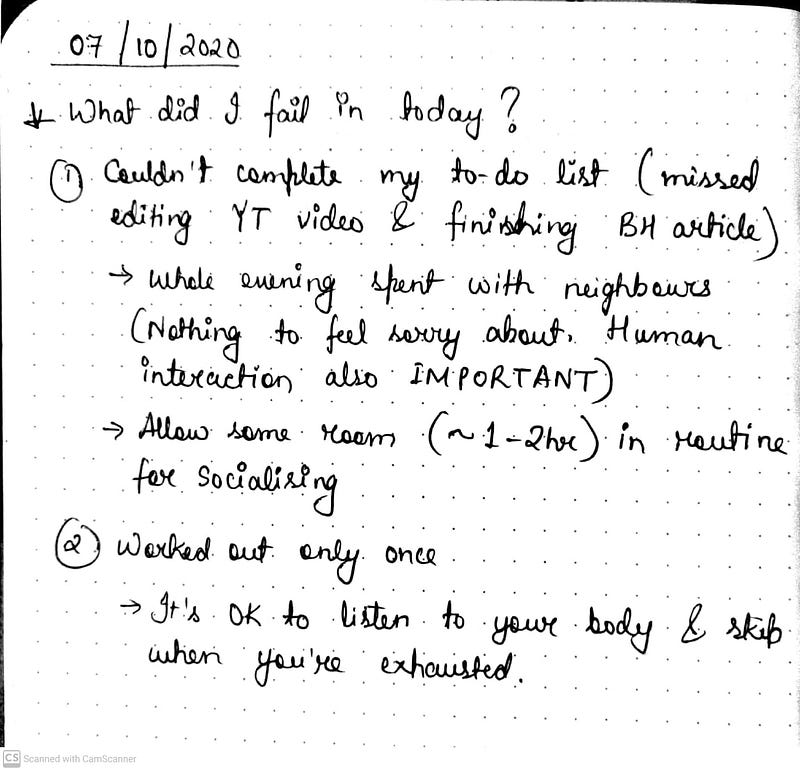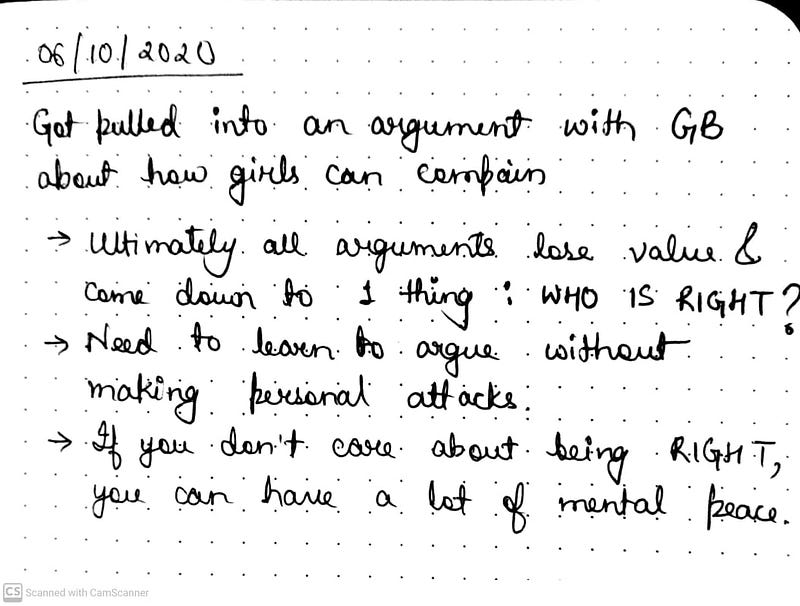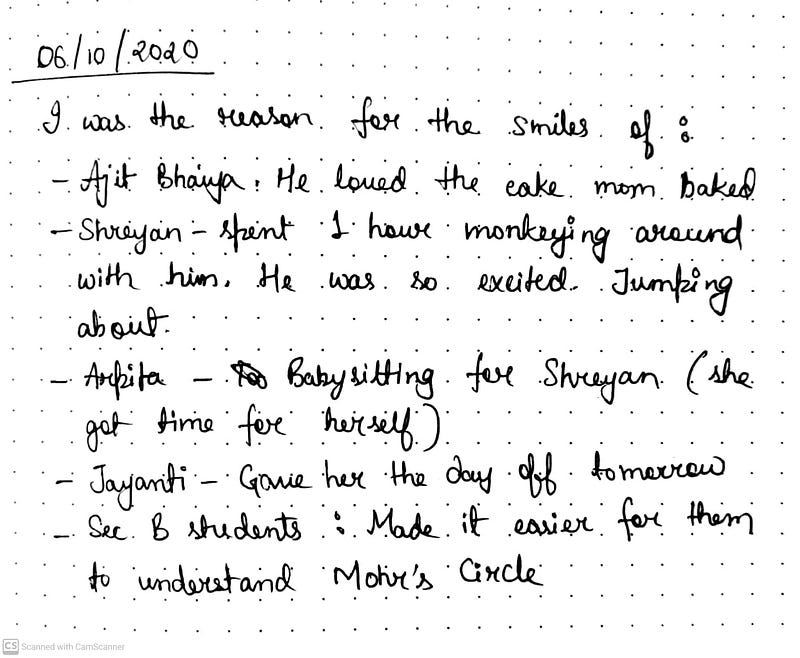3 Daily Journaling Prompts to Help You Understand Yourself Better
Self-awareness and growth through journaling

Self-awareness and growth through journaling
Daily journaling has been a part of my routine for fifteen years. The resolution I made in my teenage years to embark on a journey towards self-healing has now become a habit.
As a teenager, my journals were more like diary entries. They helped me look objectively at the happenings of the day and derive lessons from them. It was akin to talking to a friend and gave me a lot of peace. As daily journaling was already helping me understand myself so well, I decided to do some research on practices that can enhance my old habit to make it more productive and fun.
A study by a teacher who analysed student journal data from the past 25 years has established reflective journaling as an excellent tool. It can induce valuable insights into a person’s feelings, beliefs, values, and attitudes. Writing daily about stressful events also helps reduce the impact of these stressors on your physical health. Journaling has been known to clarify a person’s thoughts and feelings, and help them solve problems more effectively.
Backed by research, here are three prompts to help you redefine your happiness and understand yourself and your life better.
What Do You Do When You Hit a Roadblock?
The productivity-obsessed times of today have made it difficult for a person to cope with failure. But, if you seek to analyse the lessons you learned from each time you tried and failed, you can gain valuable insights on how you can move ahead from them and define a better tomorrow for yourself.
A few days back, I was beating myself up about how I failed to achieve more than half the tasks on my to-do list. This is more common than you would think. A comparison of the results of 160,000 users from the productivity tracker app, I Done This, showed that 41% of people’s to-do items are never completed.
It took me intense sessions of journaling to understand that I had probably bitten off more than I could chew, and it was essential to allow myself some room for relaxation as well.

I learned this prompt from entrepreneur and founder of Spanx, Sara Blakely, who has an interesting take on failures. In an interview with Business Insider, she shared how her father used to ask her and her siblings to name at least one thing they failed in during the day.
“What it did was reframe my definition of failure. Failure for me became not trying, versus the outcome.”
Failures are essential because if you fail, it means you tried.
And as long as you keep trying, you will keep learning new skills. Irrespective of the outcome, something as valuable as this can never be considered as a failure.
How you can do this:
The journaling prompt is simple. Ask yourself: What did I fail in today?
The failure can be something as simple as cheating on your diet plan or major incidents like failing to land the client you had hoped for.
Next, try and list at least two lessons you learned from the failure. This will help you analyse what went wrong and how you can move a step closer towards making sure this never repeats again.
How To Complain Less, and Appreciate More
Broadly speaking, gratitude is the sense of thankfulness and joy you feel in response to receiving a gift. Besides being characterised as a moral virtue and as an emotion, gratitude has also been defined as an attitude, a habit, a personality trait and a coping response.
Cultivating a habit of gratitude pertains to being thankful for every small gift life showers upon you. When you learn to find reasons to be grateful in every situation, you feel happier and less stressed out. No matter what bad news comes your way, you’re able to take it in your stride better.
I had been practising some form of gratitude journaling since my teenage years, but I was inspired by author and entrepreneur Pat Flynn’s take on it. After reading about the way he practised gratitude journaling twice a day, I decided to incorporate it into my routine.
“As soon as I wake up I think about the amazing things in my life and it primes myself for an amazing day. Right before I go to bed I think about the amazing things that happened and I can get excited to wake up the next day. Adding journaling to my life has been really really cool and something that I thought was just for teenage girls to write when their boyfriends break up with them, but I really really love it.”
I found a lot of peace after consciously looking for reasons to be thankful in the day. Even if a day was filled with negativity, this practise helped me smile for a while before going to bed.
How you can do this:
There are two ways you can apply gratitude journaling in your life:
- Use this prompt: 5 things I am grateful for today.
- Take the worst incident that happened to you in the day. Look for the silver lining. Really rack your brains and try to understand what are some reasons why you’re grateful for that incident.
You can use either or both these prompts. I sometimes find myself applying a mix of both.

Whichever prompt you choose, your focus should be to look for the brighter aspects of whatever situation you find yourself in. This will help you develop a positive attitude. You will find yourself complaining less and looking for the silver lining in every cloud that darkens your horizon.
How To Find Happiness in Daily Tasks
I have come to the understanding that no matter how much you achieve, there is a sense of accomplishment in adding value to the lives of others.
This is also a key tenet of the principles of the Austrian psychotherapist, Alfred Adler. Adlerian psychology states that one can derive true happiness from the knowledge that they have contributed positively to society. This is also discussed in the book The Courage to be Disliked by Ichiro Kishimi and Fumitake Koga:
“If one really has a feeling of contribution, one will no longer have any need for recognition from others. Because one will already have the real awareness that “I am of use to someone,” without needing to go out of one’s way to be acknowledged by others.”
How you can do this:
At the end of each day, ask yourself a version of the following questions:
- How did I add value to someone else’s life today?
- Was I the reason behind someone’s smile?
- What did I do to make the world a better place?
Sure, these sound like difficult questions to answer, but once you start digging in, you will find your day strewn with moments your presence meant something to the people around you.

An added benefit of this journaling prompt is that you will be mindful throughout the day, trying to add more value. This will eventually help you become a kinder, more compassionate version of yourself.
Final Thoughts
Journaling has helped me understand things about myself I wouldn’t have known otherwise. It helped me uncover patterns in my thoughts and behaviours, leading me to the conclusion that I put too much pressure on myself about being productive every single day. It has also helped me become kinder to myself and celebrate the small wins I gather along the way.
The more I journaled, the more I was able to transition into a person driven by excitement, and not held back by self-recrimination.
Above all else, journaling is a habit that forces you to confront the thoughts you might have been suppressing, or might even be unaware that you had them in the first place.
At the end of a tiring day, it might surprise you what pours out when you take a journal and start writing.


Join my email list to get a thought-provoking story for FREE each week
